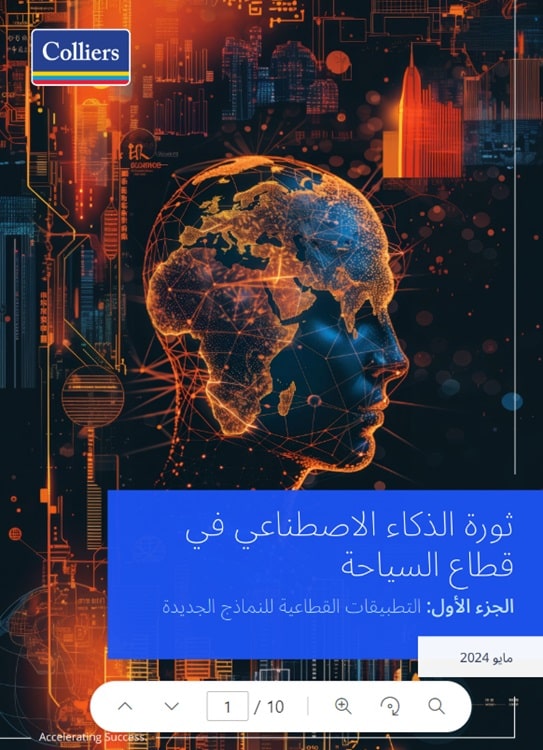As the world continues its shift towards digitalisation, the tourism industry, prepares for an AI revolution. The adoption of Artificial Intelligence (AI) is no longer just a trend, but a strategic approach to build a smarter future. This rapidly developing technology is set to create a transformative change within the industry, offering limitless opportunities to enhance customer experiences and operational efficiency.
In the Middle East, there is considerable anticipation surrounding the expected role of AI in tourism. Renowned for its rich history, significant cultural heritage and warm hospitality, the region stands at the threshold of a transformative era that could harmonise its cherished traditions with the sophistication of cutting-edge technology.
Colliers’ upcoming market report series, starting with the introductory edition, ‘RevolutionAIsing Tourism: Sectoral Applications of New Paradigms’, explores AI’s expanding role in this era’s digitised travel and hospitality landscape and the implications in the context of the Middle East. It sheds light on the imperative nature of AI adoption and the various transformative applications of the technology, showcasing its capacity to reinvent customer engagement and streamline operational processes, as well as its potential in creating bespoke travel content and transforming the way destinations are experienced.
Beyond the promising opportunities, the journey towards AI integration in tourism is not without its challenges, as highlighted in the report. Ethical considerations and issues related to data privacy, intellectual property and discrimination are examined, recognising the importance of addressing these concerns for sustainable progress.
Naiara Giner, Tourism Advisory Lead, Colliers in MENA, remarks, “Artificial Intelligence is indeed a beacon for the future of travel. It is setting the stage for a new era of experiential travel in the Middle East, synthesising tradition and innovation.
She adds, “In embracing AI, we’re not just following a global trend. We’re consciously positioning the Middle East as a leader in innovative and responsible tourism. This approach promises to redefine the travel experience by providing a seamless blend of the old and the new, ensuring that our rich legacy continues to flourish in the modern narrative of travel.”
Looking ahead, the future of AI in tourism holds immense promise. As AI technologies continue to evolve, they are poised to revolutionise travel logistics, personalise customer experiences and drive operational efficiencies to unprecedented heights. Yet, amidst this wave of transformation, it is necessary to approach AI adoption with a balanced perspective, ensuring that ethical considerations are taken into consideration. By embracing AI responsibly and addressing associated challenges proactively, the industry stands to unlock unparalleled opportunities for growth and evolution.
This report is the first of a 3-part series titled ‘RevolutionAIsing Tourism through AI’. The second part of the series, soon to be published, will discuss the use of AI for public sector stakeholders, covering topics such as the creation and personalisation of the destination’s experiential offer, marketing and promotion, investment attraction and others, supported with exclusive interviews and case studies. Similarly, the third part of the series will explore the use of AI for private sector stakeholders such as hotels, travel agencies, tour operators, etc, looking into applications for resource and cost optimisation, pricing, marketing and more.





